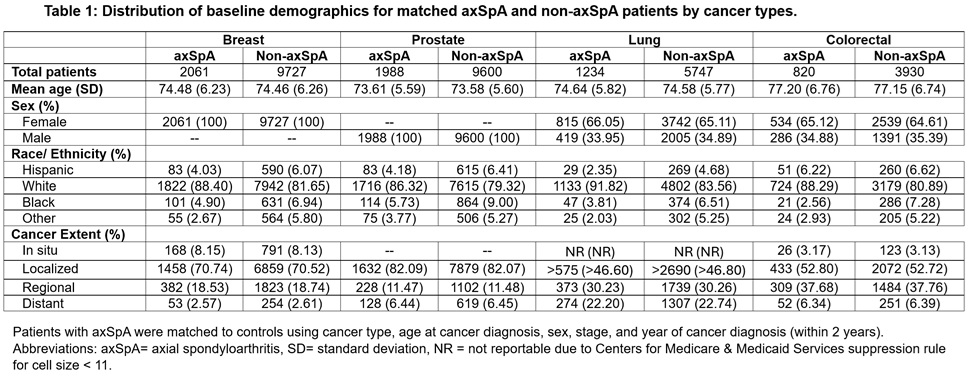Session Information
Date: Monday, October 27, 2025
Session Type: Poster Session B
Session Time: 10:30AM-12:30PM
Background/Purpose: Axial spondyloarthritis (axSpA) is associated with several comorbidities, including cancer. Prior studies have shown that elderly patients with rheumatoid arthritis and concomitant breast or prostate cancer have worse survival outcomes than patients with cancer alone. Our objective was to examine survival outcomes in elderly patients with recently diagnosed cancer, with or without axSpA, as there are currently no studies investigating survival outcomes in this population.
Methods: We conducted a population-based study using Medicare claims linked to the Surveillance, Epidemiology, and End Results (SEER) to examine overall survival (OS) and cancer-specific survival (CSS) in patients aged ≥ 66 with 1 of the 4 most common types of cancer (breast, prostate, lung, colorectal) diagnosed between 2006-2019 with or without axSpA. Patients in the axSpA cohorts were required to have ≥2 claims with an ICD 9/10 diagnosis of axSpA. For the non-axSpA cancer controls, we excluded patients with claims for connective tissue diseases. Patients with axSpA were matched to 2-5 controls using cancer type, age at cancer diagnosis, sex, stage, and year of cancer diagnosis. We investigated OS and CSS (censored at 5 years). Kaplan-Meier (KM) analysis and log-rank tests assessed survival time in patients with or without axSpA. Cox proportional hazard regression models were performed for each cancer, with analysis adjusted for competing risks for CSS.
Results: There were a total of 6103 patients (2061 breast, 1988 prostate, 1234 lung, 820 colorectal) with axSpA matched with 29,004 controls in this study (Table 1). Mean ages ranged from 74 (breast, prostate, lung) to 77 (colorectal) (Table 1). Table 2 shows the results of 5-year OS and CSS estimates and Cox regressions within each type of cancer. No statistically significant differences were observed in OS or CSS between patients with or without axSpA, for breast, prostate or lung cancer. For colorectal cancer, patients with axSpA had a decreased risk of death compared to patients without axSpA: 5-year OS hazard ratio (HR): 0.72 (95% CI: 0.62-0.83, p=< 0.0001) and CSS HR: 0.73 (95% CI: 0.55-0.97, p=0.03) (Table 2).
Conclusion: Elderly patients with axSpA and concomitant breast, prostate, and lung cancer had similar OS and CSS compared to patients with cancer alone. Elderly patients with axSpA and concomitant colorectal cancer were associated with increased OS and CSS compared to patients without axSpA. Further research is needed to explore the potential reasons for longer survival in elderly patients with colorectal cancer and axSpA compared to those without axSpA.
To cite this abstract in AMA style:
Bowman S, Li M, Lei X, Zhao H, Ruiz J, Giordano S, Ogdie A, Suarez-Almazor M. Survival Outcomes in Elderly Patients with Axial Spondyloarthritis and Concomitant Cancer [abstract]. Arthritis Rheumatol. 2025; 77 (suppl 9). https://acrabstracts.org/abstract/survival-outcomes-in-elderly-patients-with-axial-spondyloarthritis-and-concomitant-cancer/. Accessed .« Back to ACR Convergence 2025
ACR Meeting Abstracts - https://acrabstracts.org/abstract/survival-outcomes-in-elderly-patients-with-axial-spondyloarthritis-and-concomitant-cancer/


.jpg)